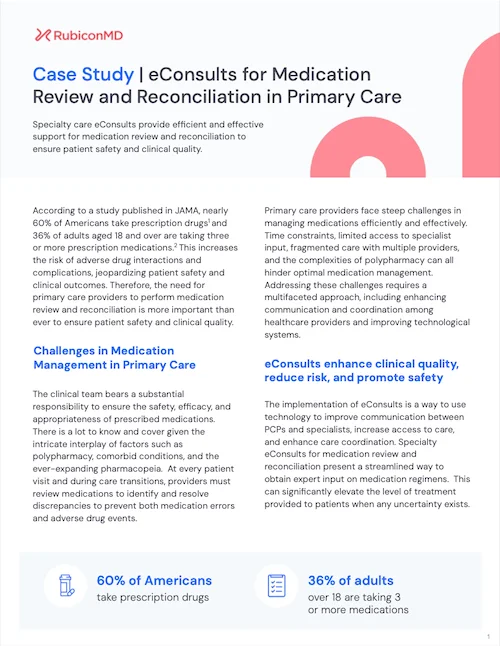How Virtual Specialists Help PACE Organizations Meet Regulatory Requirements
The Program of All-Inclusive Care for the Elderly (PACE) plays a vital role in helping older adults remain in their…
In a recent RubiconMD CME webinar, “Trauma-Informed Primary Care: ACEs, PTSD, and Chronic Stress,” Ludwing Salamanca, MD, PhD of Columbia University shared critical insights into how trauma affects public health and how clinicians can sensitively respond using evidence-based care, including tools like specialty eConsults.
Trauma-Informed Primary Care (TIPC) is a clinical and organizational approach that recognizes the widespread impact of trauma on health and emphasizes safety, trust, and patient empowerment. Instead of asking “What’s wrong with you?” TIPC reframes the conversation to “What happened to you?”—a critical shift given that up to 70% of adults experience trauma in their lifetime, and many will present in primary care with trauma-related symptoms.
Integrating trauma-informed principles into routine primary care can be challenging, especially limited access to behavioral health expertise. That’s where specialty eConsults come in—offering practical, real-time support for PCPs navigating complex, trauma-related patient issues.
Here are 5 ways eConsults can support PCPs in giving the best patient care through a trauma-informed lens:
Many trauma survivors don’t disclose their history, but they may present with chronic pain, fatigue, missed appointments, or mistrust. Through eConsults, PCPs can consult with virtual psychiatrists to interpret red flags and decide when to use validated screening tools like the PCL-5—without overwhelming or retraumatizing the patient.
Trauma-informed care calls for a shift in communication and care planning. eConsults offer guidance on how to build trust, frame difficult conversations, and involve patients in their own care—helping PCPs apply trauma-informed principles while maintaining efficiency and compassion in the primary care setting.
When facing PTSD or trauma-related comorbidities, eConsults allow PCPs to confirm appropriate use of treatments like SSRIs or CBT and avoid less effective or risky options (e.g., benzodiazepines). They also help identify when it’s time to refer for specialized trauma therapies such as EMDR or CPT.
Patients with trauma often present with overlapping physical, emotional, and behavioral health issues. eConsults enable quick, case-specific input from psychiatrists—helping PCPs manage care confidently without long referral delays, and often without needing to refer at all.
Beyond the exam room, eConsults can support PCPs and care teams in developing clinic-wide trauma-informed strategies—such as engaging patients in care decisions, supporting staff wellbeing, and creating emotionally safe environments for both patients and providers.
Up to 70% of adults will experience at least one traumatic event in their lifetime, and around 20% may develop PTSD. Trauma deeply impacts physical and mental health—contributing to chronic illnesses like heart disease, COPD, diabetes, depression, and substance use disorders. The CDC-Kaiser ACE study underscores this link, showing that individuals with four or more ACEs face significantly higher risks of poor health and may lose up to 20 years of life expectancy. Trauma is not just a behavioral health concern—it’s a critical public health issue, making primary care the front line of identification and intervention.
Trauma-informed care is not just a clinical best practice—it’s a necessary evolution of modern medicine. By recognizing the profound impact of trauma and integrating compassionate, evidence-based strategies, providers can better serve patients and improve long-term outcomes.
For more trauma-informed screening and assessment tools, register now to watch the full CME webinar recording.
The Program of All-Inclusive Care for the Elderly (PACE) plays a vital role in helping older adults remain in their…
By Dr. Mickey Lui, DO, MPH, presented as a RubiconMD CME Webinar Access to timely, high-quality orthopedic care remains a…
In January, we outlined the top trends set to shape primary care in 2025, with a focus on how eConsults…

Explore real examples of specialty care eConsults providing efficient and effective support for medication review and reconciliation.